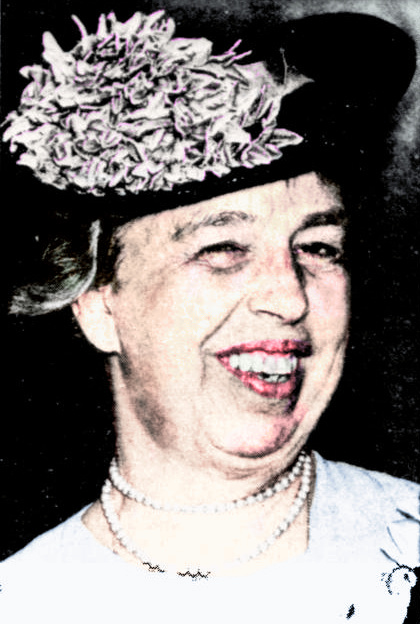
MY DAY
By Eleanor Roosevelt
December 1, 1939
Washington, Thursday –
I must confess to being somewhat embarrassed last night at the 135th anniversary dinner of The Churchman. Both the speeches and the actual presentation of the award, made me feel somehow a bit unreal. When you sit and hear people whom you admire and respect, say things which might well apply to somebody else, but can’t apply to you, and find that you have to get up and accept all this – well, it’s disconcerting. It would be idle, however, not to acknowledge that it is pleasant to be well spoken of, and that it does give one courage to keep on trying to be more worthy of all that has been said.
I went to the station after the dinner, just in time to catch the 12:50 a.m. train, and found there a group of young people whom I know, members of the American Youth Congress and other organizations. Mr. Will Hinckley, who was chairman of the American Youth Congress some three years ago, was subpoenaed to appear before the Dies Committee in November, but that date was postponed. Between 4:30 and 5:00 yesterday afternoon, a wire was received stating that Mr. Hinckley would be given an opportunity to be heard before the Committee at 10:00 this morning.
It is usual, of course, when one appears before as important a committee as a Congressional committee, to have information and all material that may be called for near at hand. Of necessity, this group of young people, none of whom are affluent, had to do some tall hustling to get anything together and be in Washington this morning, particularly as Mr. Hinckley had been ill for several days and was just out of bed. Some of the group went down on the train with me, some of them sat up all night in a day coach on the next train, because Pullman berths cost money. Youth is remarkably resilient, however, and when I went into the committee hearing this morning, they all looked to me quite wide awake. They were, however, not testifying and I listened for an hour to a rather able witness who, however, told me nothing new.
I have two real interests in this situation. One is that as far as is humanly possible, I give to young people whom I know and trust, the feeling that in any situation, particularly a difficult one, they may count on my assistance. My second interest is a desire to observe to what extent the Government is not only striving to uncover un-American activities, but is giving to youth the assurance that their government does not look upon them with suspicion until they are proved guilty, and is anxious to help them in every way to build up the faith and trust in democracy which should be the heritage of every youngster in the United States.
A number of people lunched with me and I am now going back to the committee room in the hope of hearing testimony given by Mr. Hinckley, the former chairman of the American Youth Congress.